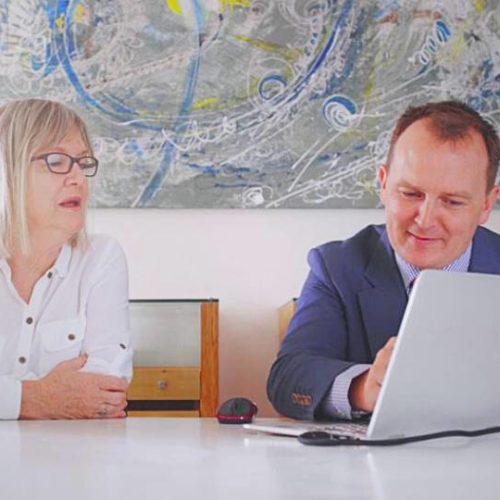But, how do you tell if your financial plan is built for your life—or someone else’s bottom line?
There are a couple of questions you can ask yourself (or maybe your financial adviser) that will help answer that very question:
-
Has your life actually changed?
-
Are you closer to the lifestyle you imagined, or are you just collecting paperwork?
💬 What Real Financial Advice Feels Like
Real advice isn’t just about managing money—it’s about helping you live the life you want.
It should feel like:
- Confidence that your future is sorted.
- Clarity about how your finances support your lifestyle.
- Freedom to focus on what matters most—without second-guessing your plan.
A great adviser is part strategist, part translator. They know the technical stuff inside out, but they also know how to make it meaningful to you.
Example:
Belinda had a $1.5M portfolio and thought she was doing fine. Her financial adviser focused on returns and some tax savings, but never asked about her goals. When she switched to a goals-based adviser, she realised she could retire three years earlier, buy the period home she’d always dreamed of, and still have enough to support her kids. That’s the power of real advice.
🛑 What Selling Looks Like
If your adviser is more focused on what you own than what you want, you might be getting sold to—not advised.
Here are a few signs:
- They’re obsessed with picking investments but don’t talk about your lifestyle.
- You’ve got a complex SMSF setup, but the after-fee returns are no better than a simple structure (particularly after including accounting and auditing).
- You get ROAs (Records of Advice) every year; there are never any new strategies that improve your situation, even though there have been significant changes to tax, superannuation and social security legislation over the last 10 years.
- They’ve never brought up social security, debt, aged care, or, most importantly, cash flow.
- Your plan feels static—even though your life isn’t.
- They make you feel like strong returns are the be-all and end-all of a good financial plan—so you get rich, but on reflection, miss out on all the good stuff that money is supposed to be used for.
Example:
Mark had an SMSF with direct shares, managed funds and some other unlisted assets. His adviser was proud of the complexity. However, upon reviewing the numbers, Mark found that his net returns were comparable to those of a basic index fund, while his total fees for SMSF & investment management exceeded $10,000. Worse—he hadn’t taken a holiday in five years because he was “waiting for the right time”. Sure, his money seemed to be growing, but his life was on hold.

🤷 Common Misconceptions
Many people believe their accountant or investment specialist has all the answers. But when it comes to retirement planning, things get technical—and not everyone’s equipped to handle that.
We’re talking:
- Super contributions and pensions
- Centrelink rules
- Aged care planning
- Strategic debt and cash flow management
- Goal conflicts—the kind that can quietly derail your plans if no one’s paying attention.
Example:
Take Sarah. Her accountant told her to make a large concessional contribution to super to reduce tax. Technically, it made sense. But no one asked how she planned to fund her home renovation or retire before 60 which were her real goals. The contribution locked away funds she needed in the short term. A goals-based adviser helped her restructure the strategy—balancing tax savings with lifestyle priorities.
🔄 The Transformation: From “Fine” to Fantastic
Here’s what happens when you move from a poor adviser to a great one:
With A Poor Adviser
| You get investment updates |
| Your plan rarely changes |
| You feel unsure about aged care, super, or debt |
| You wonder if you’re missing something |
| You get Records of Advice (ROA), not Statements of Advice (SOA) |
| You chase returns |
With A Great Adviser
| You get lifestyle-aligned strategies |
| Your plan evolves with your life |
| You feel confident and informed |
| You know you’re making the most of every opportunity |
| You get real advice |
| You chase experiences |
Example:
Tom thought his adviser was doing a good job—until he met someone new. Within six months, he’d restructured his super, downsized his home, and booked a six-month trip around Australia. His finances didn’t just improve—his life did.
✅ Quick Checklist: Are You Being Advised or Sold To?s
Ask yourself:
- Do I understand how each recommendation connects to my goals?
- Has my adviser ever talked about aged care, social security, lifetime cash flow management, or debt?
- Do I get strategic updates—or just investment reports?
- Is my financial adviser actively trying to improve my plan?
- Do I feel more confident after each meeting?
If you answered “no” to more than one, it might be time to rethink things.
Financial advice should grow with you, adapt to your life, and help you feel good about the road ahead.
So here’s your next step:
Go on a few financial adviser ‘dates’. Meet someone new. Ask questions. See how it feels.
And if you already have a great adviser—someone who’s helping you live better, worry less, and plan smarter—tell your friends and family. Good advice is worth sharing.

If you’re interested in learning how to plan your wealth before you retire, check out our Retirement Planning page for more information.
Any advice on this site is general nature only and has not been tailored to your personal objectives, financial situation and needs. Please seek personal advice prior to acting on this information. Any advice on this website has been prepared without taking account of your objectives, financial situation or needs. Because of that, before acting on the advice, you should consider its appropriateness to you, having regard to your objectives, financial situation or needs.


